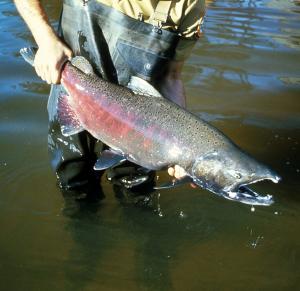forum
library
tutorial
contact

Columbia Tribes Give Up Call For Breaching Dams
by Rocky BarkerIdaho Statesman, April 8, 2008
|
the film forum library tutorial contact |

|
Columbia Tribes Give Up Call For Breaching Damsby Rocky BarkerIdaho Statesman, April 8, 2008 |
But the Nez Perce didn't agree to the deal that provides more money for hatcheries and habitats

Three Pacific Northwest Indian tribes agreed Monday to stop pushing in court to breach four federal dams on the Lower Snake River in exchange for $900 million over nine years for new hatcheries and salmon habitat rehabilitation projects. Federal dam managers also agreed not to challenge a tribal agreement with Oregon and Washington that will let the tribes catch more salmon in years when hatchery fish are abundant.
The agreement, which the parties called historic, gives the tribes incentives to back the Bush administration's plan for salmon and dams. But it doesn't end 15 years of lawsuits over the fate of 13 stocks of salmon and steelhead protected by the federal Endangered Species Act.
Idaho's Nez Perce Tribe did not sign on to the agreement, but Tribal Chairman Sam Penney said the tribe is still in talks with the federal agencies.
"The dams on the Lower Snake River and mainstem Columbia have significant impact on the fish and the Nez Perce Tribe," Penney said.
U.S. District Judge James Redden declared the latest salmon and dam plan, called a biological opinion, inadequate in 2006. He also rejected a similar plan for the Bureau of Reclamation's dams in the Upper Snake, including those on the Boise River.
The tribes had joined environmentalists, anglers and sporting businesses in challenging the plans as they have done repeatedly since the early 1990s. But this deal could move the tribes to the other side. If Redden shoots down the government's next attempt to write the biological opinions, scheduled to be released next month, the tribes will not get the money for more than 200 projects designed to help recover salmon.
"The agreements will get our governments out of the courtroom and back on the firm ground of mutual goals and collaboration," said Fidelia Andy, chair of the Fish and Wildlife Committee of the Yakama Nation Tribal Council and chairwoman of the Columbia River Inter-Tribal Fish Commission.
The deal included the Warm Springs, Yakama and Umatilla tribes. The Nez Perce are the fourth member of the tribal fish commission.
The Bonneville Power Administration, which markets the electricity from dams in the Northwest, has led efforts to find agreement between the federal dam managers, the tribes and the states.
"Today these parties are saying, let's lay down the swords, let's spend more time working collaboratively to implement measures that help fish and less time litigating," said Steve Wright, BPA administrator in Portland.
Around the same time the National Marine Fisheries Service is scheduled to release new biological opinions on the dams, the agency is expected to release a separate biological opinion on the effects of tribal, sport and commercial fishing - based on an agreement negotiated between the states of Oregon and Washington and the tribes.
The deal cut Monday prevents federal agencies from challenging in court what the tribes get from the harvest agreement - the ability to catch more fish in years when hatchery fish are abundant, by shifting the number of wild fish that can be taken incidentally to tribal fishermen from sport anglers.
Idaho has been negotiating a separate deal with BPA for habitat and hatchery programs in the state, and that is near an agreement. But this won't prevent Idaho officials from challenging any salmon harvests it considers a threat, said David Hensley, chief counsel for Idaho Gov. Butch Otter.
"We're concerned about harvest," said Hensley. "That's something the governor is constantly looking at."
The agreement leaves Oregon as the only government challenging the two federal dam plans in Redden's court.
"This deal doesn't change the law and it doesn't change the science," said Todd True, who represents environmental groups in the lawsuit. "The agencies still have to comply with the Endangered Species Act."
Idaho Rivers United Director Bill Sedivy did not want to criticize the tribes that made the deal since they work as partners on many salmon issues. But he applauded the Nez Perce.
"Once again, the Nez Perce Tribe has made a courageous decision for wild Idaho salmon and steelhead," Sedivy said. "I hope they will continue to hold this line under what must be incredible pressure from BPA, so they can fully participate in all legal and scientific discussions about real salmon recovery."
WHAT IS THE AGREEMENT DESIGNED TO DO?Related Sites:Both sides hope that by working on the ground rather than fighting in court they can get more done to help salmon, especially in the Columbia River where the four lower Snake dams do not hinder migration. This could offer Judge James Redden more certainty that the projects will benefit the fish as he has demanded.
How do I comment?
Comments will be accepted until close of business April 23. Comments may be submitted via e-mail to comment@bpa.gov.
learn more on topics covered in the film
see the video
read the script
learn the songs
discussion forum
